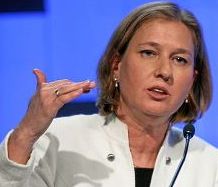FEATURE: Tzipi Livni warms the opposition benches
 Tel Aviv - Her Kadima party may have won the most seats in Israel's February 10 election, but as the Israeli government is sworn in, Tzipi Livni finds herself the big loser, moving from the high- profile foreign ministry to the opposition front bench in parliament.
Tel Aviv - Her Kadima party may have won the most seats in Israel's February 10 election, but as the Israeli government is sworn in, Tzipi Livni finds herself the big loser, moving from the high- profile foreign ministry to the opposition front bench in parliament.
At least for the short term.
Kadima won 28 seats in the election, one more than the Likud headed by incoming prime minister Benjamin Netanyahu. Despite Livni's assertion that she should be the one to form the next government, President Shimon Peres tapped Netanyahu for the task, after consultations with Knesset factions showed he had the better chance of setting up a coalition.
Netanyahu could easily have formed a narrow right-wing government, but mindful that this would create problems abroad, and would not be politically stable, announced his main priority was a unity coalition and tried to entice Livni to join him.
Although he offered Kadima two of the top three cabinet posts, and agreed to let the party join with the Likud in drafting coalition guidelines, he failed to tempt her.
Livni demanded a a power-sharing agreement, whereby she and Netanyahu take turns at the premiership, and also demanded that the Likud leader commit to a Palestinian state. Netanyahu refused both demands, and Kadima, the ruling party from 2006, was headed for the opposition.
If Livni was gambling on Netanyahu being so desperate to form a broad-based government that he would give into her demands, she failed.
And if she was hoping that Netanyahu would form a narrow right- wing government with a brief life expectancy she was disappointed, outmaneuvered by the incoming premier and outflanked by Ehud Barak, leader of the left-to-centre Labour Party.
Barak, after announcing the 13-seat Labour Party would be in the opposition, convinced his reluctant party to join a Netanyahu-led government, thus giving Netanyahu a broader-based government, with more international appeal and without having to give in to Livni's demands.
But Livni's failure may yet prove to be superficial and short-term only.
Netanyahu may have formed a broad-based, or at least broader- based, government, but its survival is not guaranteed, containing as it does parties from the religious right to the centre-left, bedfellows who are not only strange but also strained.
Any number of pitfalls lie ahead, from the peace process with the Palestinians - which could see the Labour Party bolt if the process drags, or the right-wing parties leave of the process moves too quickly - to socio-economic issues, where the Labour Party and the ultra-Orthodox religious Shas party could depart if these problems are not addressed to their satisfaction.
Should Netanyahu lose his government majority because of coalition defections, he could turn to Livni again, perhaps agreeing to her demands in order to save his premiership.
Or Israel could head for new elections, which would allow Livni, her stand against joining the government still fresh, to claim the moral high ground.
During the recent campaign, she tried to present herself as a "new kind of politician", disdainful of the horse-trading so characteristic of Israeli politics.
Her refusal to join a Netanyahu government because of his public refusal to endorse a Palestinian state, would allow her to claim that she has stuck to her principles at the price of office. This might win her enough votes from cynical Israelis disgruntled with the "usual" politicians, to emerge as the clear winner.
But for this to happen, Livni has to survive in opposition.
She narrowly won the Kadima leadership primary in September last year, beating off a determined challenge from Shaul Mofaz, who, according to reports, was eager to join the Netanyahu government.
Although Livni has said defections from Kadima are unlikely, Netanyahu could yet target Mofaz - the man he appointed as military chief of staff in 1998, during his first stint in the premiership.
A Mofaz defection to the government - possibly taking some Kadima legislators with him - would not only boost Netanyahu, but would also seriously damage Livni's chances of going to the next election as the head of a united party which led a fighting opposition. (dpa)